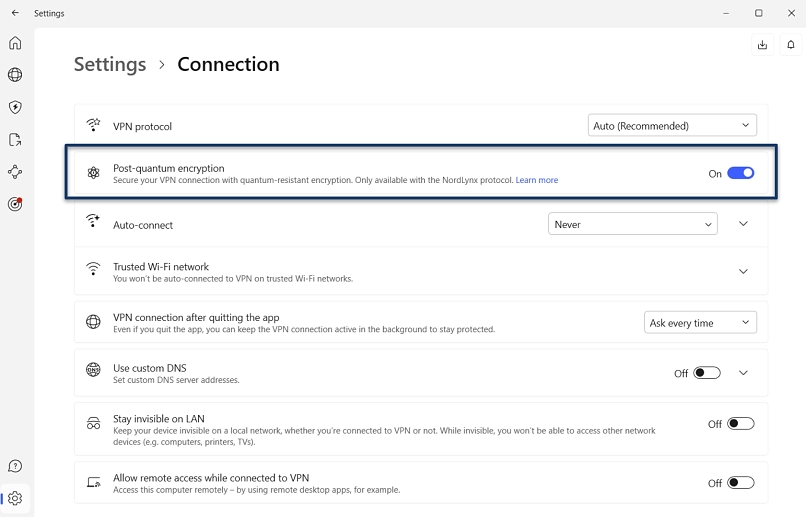NordVPN Expands Post-Quantum Encryption to All Major Apps

Leading VPN provider NordVPN has announced that it will roll out post-quantum encryption on all its major app-supported platforms. In NordVPN’s implementation, post-quantum encryption is integrated with its proprietary NordLynx protocol. Based on WireGuard, NordLynx is available on all of its applications and is the default protocol used in most situations.
After updating the app to the latest version, users will see a Post-quantum encryption toggle under Settings > Connection. Once enabled, every NordLynx connection will automatically be secured using NordVPN’s post-quantum cryptography (PQC). However, it does not currently work with NordVPN’s dedicated IPs, Obfuscated servers, or Meshnet.
NordVPN first unveiled post-quantum encryption (PQE) for its Linux apps in late 2024 but has decided to expand its support for it to Windows, macOS, iOS, Android, Android TV, and tvOS.
Crucially, NordVPN’s post-quantum encryption adheres to the latest NIST (National Institute of Standards and Technology) standards. NordVPN has adopted the NIST’s ML-KEM algorithm (formerly CRYSTALS-Kyber) for its implementation.
Although quantum-based decryption is not a reality yet, upgrading to this technology now is essential for individuals and businesses to “future-proof” their data. PQC involves developing cryptographic algorithms using current technology to resist decryption against attacks using quantum computers.
It’s different from quantum cryptography (QC), which uses actual (theoretical) quantum computing techniques as part of the cryptography process.
As NordVPN explains, “PQC is the next step in staying ahead of cyber threats. Quantum computing is coming fast, and PQC will protect sensitive data — especially in finance, healthcare, and government agencies — against potential threats like the “Harvest now, decrypt later” attacks.”
NordVPN is not the only, nor the first, major VPN provider to deploy PQE technology. ExpressVPN’s new Linux GUI-based app also features PQE, although it’s been using the technology alongside its Lightway protocol since 2023.



Please, comment on how to improve this article. Your feedback matters!